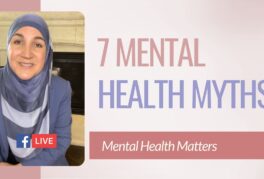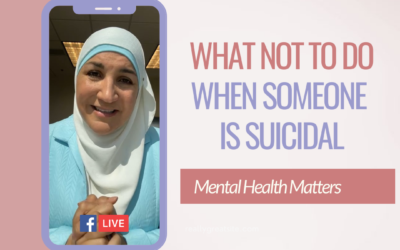There are several misunderstandings and myths about mental illness. Despite being widely spoken about in recent times and awareness being raised on various platforms, mental health is still one of the most stigmatized topics to discuss.
In this article, I want to clear the seven most common mental health myths in order to help us take the right action, especially during this pandemic. When people have wrong information, it causes them not to take action, resulting in an unwanted downward spiral.
So, what are the seven common myths about mental illness? Read on to find out.
Myth #1 : Mental health disorders are not that common
In reality, research shows that one in five individuals have a mental health disorder. So, if you take any five individuals, you find that at least one person may be suffering from depression, anxiety, bipolar syndrome, etc. It is as common as many of the other physical ailments that we see. We often put so much emphasis on getting ourselves checked if we have a physical illness like diabetes or heart disease, but with mental health, we just ignore it as nothing serious. Many people ignore it until they suffer a major occurrence like a mental breakdown.
Myth #2 : Children or teens don’t have mental health disorders
Research has shown that one in five children have mental health issues and that 50% of the population is suffering from some kind of problem or another. We need to address this and make sure that our children, especially right now during the pandemic, are not suffering silently. If your child is feeling depressed or anxious, and is exhibiting some kind of symptoms that you feel are unusual, like being totally withdrawn or isolated, or showing no interest in the things that they’re doing, don’t think twice to take action. It is important to recognize that it could be a mental illness disorder.
Myth #3: Psychiatric medication is unsafe
Many people have this fear that psychiatric medication is unsafe. This is far from the truth. If you use the medications as per your doctor’s prescription, you shouldn’t have any kind of issues. You need to realize that medications are there to heal you. For example, if someone is extremely depressed and is having suicidal thoughts, this could be due to a chemical imbalance that can be corrected with the right type of medicine.
Myth #4: Therapy is time-consuming
Many people feel that therapy may take years, and is not a quick-fix solution to the problem that they are facing. You need to realize that there are different forms of therapy. If you have cognitive behavioral therapy, that is very much solution-focused, where you get quicker results. Before working with someone, you need to ask what kind of approach they use, because depending on your case and the methodology the therapist wishes to apply, the time span can vary significantly from person to person.
Myth #5 Mental health has no recovery
Many people assume that once you have a mental health disorder, then there’s no way to recover from it. That’s not true. If you get yourself treated early enough, you can completely recover from your issues. Even if you have started treatment at a later stage, you can keep your symptoms in check and manage them if you take the right kind of treatment and are consistent with it.
Myth #6 Suicide
Many people think that if a person talks about suicide, they will commit suicide. That’s not true. In fact, if a person refuses to talk about what’s bothering them and is isolated or withdrawn, it should be a cause for concern. Some people could look totally okay on the outside but have a huge war brewing inside, leading them to take their own lives when no one expected it.
Therefore, when you see someone talk about suicide, don’t leave them hanging there. Ask questions, and let them know that you have a plan to help them feel safer and better. If the person’s sadness or anxiety is not addressed, they may attempt suicide.
So talking about suicide does not lead to suicide. Not talking about suicide can lead to suicide.
Myth #7: You think you can’t help
Many of us feel that there’s nothing we can do to help a person with a mental health issue or a mental health problem. You actually play a very important role! If you’re a family member, a friend or a spouse, you can be a source of great support. Be understanding of their situation. The worst thing that you could do is to dismiss their feelings. When you say you understand them, it could be the best way to help them heal!
Knowing about these myths will help us and our loved ones deal with these issues in a beneficial manner. Please do not ignore the mental health of your loved ones. Prioritize and seek the treatment that is necessary in order to make sure we are in the best mental health. insha’Allah.
Join us at Mindful Hearts Academy. Try it for 30 Days Risk-FREE!
For further guidance, you can find some free courses and content on how to enhance your marriage. Also, you can download a free PDF from the website to benefit from it, Insha’Allah.




I heard with CBT some go back to normal so it only helps temporary for some. I’m not sure.
Excellent description of myths around mental health
Gunaydın
Tia Corrywright
Walaikum Aslam sister
What’s the difference between coaching sessions and therapy sessions?
Waslm
Salma Khan
Allah bless you all ways
Waleyikumaslaam
Assalaamu Alaykum beautiful sister
I wish I could make my parents understand that
Will you be able to reach me at 2243882151 my name is Maria Bailey I want to talk to you about my son. Where can I find your number then I can call you
Assalamu Alaikum Maria please visit the website: https://halehbanani.com for more information on how to work with sr Haleh.
you can also call the office at:+1-469-342-3499
Charli Axel